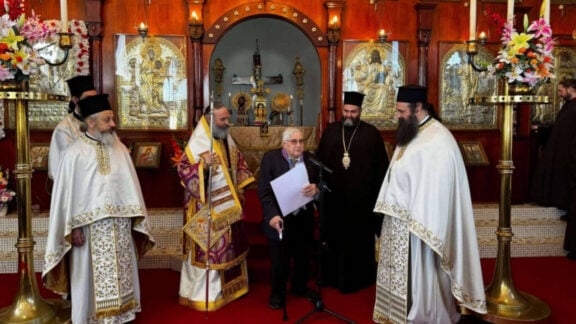Greek Prime Minister Kyriakos Mitsotakis addressed the nation during the annual PM’s press conference at the 84th Thessaloniki International Fair (TIF). “Greece will be the pleasant surprise of the Eurozone,” he said, when asked if the economy would be affected by an emerging global recession.
He said that Greece would achieve its target for high growth rates and said that he did not agree with the more pessimistic forecasts concerning the global economy.
Mr Mitsotakis noted that his government had inherited a situation that was difficult, stating however that it would be possible to implement its policies because of an over-performance in revenues during the last two months. He clarified that the government’s economic policy did not undermine fiscal discipline and was not only focused on tax cuts but also strong growth through a wave of foreign and domestic investments to create jobs.
Greek expat vote and elections
Mr Mitsotakis said that he would not give expatriate Greeks any additional rights or enlarge the electorate. “We are simply facilitating those that are already registered on an electoral roll to be able to vote in their place of residence. We are also examining the possibility of a postal vote,” he said.
He said a revision of the constitution will be completed before the end of the year, noting that this would be “of limited scope” though the government was not responsible for this.
On election law, Mitsotakis said that he did not wish to link issues relating to election law with the changes to the Constitution, noting that these were ‘two separate items’. He repeated that simple proportional representation was ‘disastrous’ and that he would therefore propose a law that would ensure governability.
“A party with 40 per cent has a right to govern,” he said.
READ MORE: Greek diaspora seeks right to vote from abroad – and it’s a debate about democracy
Greek-Turkish relations
The prime minister confirmed that he intends to have an introductory meeting with Turkish President Recep Tayyip Erdogan on the sidelines of the United Nations assembly.
“If Mr. Erdogan would like to truly restart Greek-Turkish relations then he must prove this in practice,” Mr Mitsotakis said, adding that his own intention was to engage in talks “because this is the only way to find mutually acceptable solutions. We come to the negotiation with the arguments provided to us by international law, which is on our side.”
Mr Mitsotakis said that Turkey’s actions in the Cypriot Exclusive Economic Zone (EEZ) was a European issue and one that he had raised at all his international meetings.
Another European matter, according to Mr Mitsotakis, was that of migration. He noted that Turkey had been given a great deal of money, almost six billion euros, to assist in managing migration flows.
READ MORE: Greece needs more EU funds for immigration
Primary surplus targets
Responding to criticism by main opposition SYRIZA over the negotiation on reducing primary surplus targets, Mr Mitsotakis said the government would push for a decrease of primary surplus targets, but only once Greece acquires political credibility.
“This does not mean that I don’t put this on the table during talks and explain why the surpluses are outdated,” he said. “High growth rates made the debt automatically more sustainable. We have all the arguments for the reduction of primary surpluses on our side and we will do it.”
On the tax cuts that he announced on Saturday, the prime minister said that all the measures announced for 2020 were costed and realistic and that Greece will not be taking its EU partners by surprise.
“I would not proceed to make announcements unless the measures were fully costed,” he said.
Regarding the Public Power Corporation (PPC) and the government plan for returning it to health, Mitsotakis said that the company’s liquidity needs to restored and some parts of it sold off.
“I want PPC to be a front runner in a liberalised energy market that uses renewable energy sources. We will make it profitable once more. We cannot exercise social policy via the PPC, it must be paid,” he said.
The government is interested in paying off the expensive International Monetary Fund (IMF) loans early and the finance minister will make the relevant request at the Eurogroup on Friday.
“We will save approximately 75 million euros a year from this action alone,” he said, noting that lower interest rates facilate the government’s policy and allow Greece to borrow at better rates.
Elaborating on his announcements concerning taxes during the press conference on Sunday,Mitsotakis noted that a reduction of taxes increases the general obligation for tax compliance.
“The reduction of the entry-level tax rate for freelance workers will give them an additional income to declare their income,” he said.
READ MORE: Greek PM Mitsotakis sets voting rights of Greeks abroad as a government priority
Pensioners
Mitsotakis went on to assure pensioners that the government will respect court decisions for backdated pension increases: “We will examine the fiscal margins and carry out the returns over the course of time,” he said, adding that no benefits would be cut. He promised a “concerted approach” to issues concerning people with disabilities, saying that he had undertaken this personally and that the government will present innovative proposals in this area.
On labour issues, he said the government’s goal was to “support the people of labour and full employment and to oppose all forms of employer abuse.” He repeated that a reduction of social insurance contributions will begin on July 1, 2020 and his faith in free collective labour bargaining.
READ MORE: Three issues to determine Greek elections: austerity, refugees and the Prespes Agreement
Prespes Agreement ‘nationally damaging but can’t be changed at will’
Mr Mitsotakis criticised the Prespes Agreement signed with North Macedonia, saying that it was “nationally damaging,” but noted that it has been ratified and cannot be changed at will.
“I pointed this out when I spoke in Parliament before the elections. The agreement makes no provision for any process to change it, only to monitor its implementation and on this we shall be very strict,” he said.
He referred to the need to support Greek Macedonian products and the Macedonian brand and to “win the communications game” abroad, so that people hearing the word ‘Macedonia’ will think of Greek Macedonia.
No meeting with North Macedonia’s prime minister, Zoran Zaev, has been arranged at this time but such a meeting will at some point take place, Mitsotakis added.









